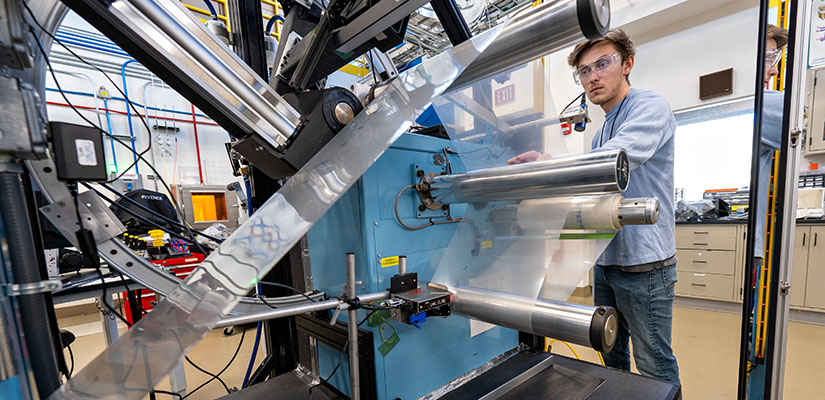NREL To Lead New Lab Consortium To Enable High-Volume Manufacturing of Electrolyzers and Fuel Cells
Roll-to-Roll Consortium Aims To Accelerate Domestic Manufacturing and Reduce Cost of Durable, High-Performance Systems

The Roll-to-Roll (R2R) Consortium is a new national laboratory consortium with a mission to advance efficient, high-throughput, and high-quality manufacturing methods and processes to accelerate domestic manufacturing and reduce the cost of durable, high-performance proton exchange membrane fuel cell and electrolyzer systems.
The R2R Consortium is led by the National Renewable Energy Laboratory (NREL) and includes Argonne National Laboratory (ANL), Oak Ridge National Laboratory (ORNL), Lawrence Berkeley National Laboratory, and Sandia National Laboratories.
High-throughput manufacturing of fuel cells and water electrolyzers is critical for achieving widespread deployment of low-cost, clean hydrogen technologies. Roll-to-roll manufacturing of materials can increase efficiency, reduce material waste, and improve cost, but there are challenges related to materials synthesis, coating, drying, and quality control that need to be addressed to scale up these processes for industry adoption.
"Our overarching goal is to de-risk and accelerate U.S. manufacturing of high-performance, durable, and low-cost fuel cells and electrolyzers," said Scott Mauger, R2R Consortium director and senior scientist at NREL. "The consortium's activities will focus on understanding the science of the manufacturing processes themselves to achieve target rates, yields, and product quality."
The R2R Consortium is funded by the U.S. Department of Energy (DOE) Office of Energy Efficiency and Renewable Energy Hydrogen and Fuel Cell Technologies Office (HFTO) through two provisions in the Bipartisan Infrastructure Law—the Clean Hydrogen Electrolysis Program and the Clean Hydrogen Manufacturing and Recycling Program.
Mauger, along with deputy directors Yuepeng Zhang of ANL and Alexey Serov of ORNL, will direct the consortium's activities. The core labs in the R2R Consortium will conduct research, development, and demonstration activities in six topic areas, each led by a lab with existing capabilities and expertise focused in that area. The first three topics address manufacturing challenges that are critical for the growth of the hydrogen industry, and the second three are cross-cutting activities that will integrate with the research on manufacturing challenges:
- Materials scale-up science
- Fabrication process science
- Quality control
- Characterization
- Advanced computing
- Techno-economic analysis.
NREL researchers Peter Rupnowski and Alex Badgett will lead research activities under the quality control and techno-economic analysis topics. This work includes developing monitoring tools to help manufacturers identify and remove defective parts and improve fabrication processes; understanding how manufacturing defects impact device performance and durability; and developing analysis models to optimize process development and examine energy use and emissions.
The consortium also plans to support industry efforts through cooperative research and development agreement projects, with more details to be announced in the coming months.
"The R2R labs have the facilities to investigate, validate, and develop new manufacturing techniques and pathways to de-risk and accelerate their implementation," Mauger said. "The R2R Consortium can help industry partners address challenges and develop scalable, affordable manufacturing processes."
An industrial advisory board will also provide guidance on the consortium's research objectives and topics and foster engagement between the broader R2R industry and fuel cell and electrolyzer manufacturers and materials suppliers.
R2R activities will complement the work of other HFTO consortia, Hydrogen from Next-generation Electrolyzers of Water (H2NEW) and Million Mile Fuel Cell Truck (M2FCT). The R2R Consortium will develop processes and pathways to scale up materials and components developed by H2NEW and M2FCT and will work closely with both consortia to ensure relevant metrics, methods, and protocols are used.
Together, these efforts will help advance DOE's H2@Scale vision and Hydrogen Shot goal of reducing the cost of clean hydrogen to $1 per kilogram by 2031.
Learn more about NREL's research in hydrogen and fuel cells and materials science.
Last Updated Jan. 22, 2026
